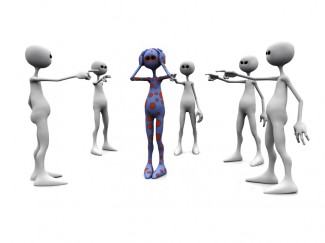
The process of diagnosing mental illness is generally finding the way in which the sufferer has deviated from what is considered to be normal behaviour. The cure is then manipulating the sufferer’s symptoms in such a way that they return to compliance of, perceived, normal behaviour, or at least appear to. Normal behaviour is, in our current quasi-Utopia known as neoliberalism, often psychopathic in its tendancies. Success and greed are celebrated, to struggle or fail is frowned upon. I say it is fair to say that “normal” behaviour could be the most severe form of mental illness that there is.
If we look upon ourselves as the animals that we are, how much of what we do in our lives could be considered normal? It’s surely fair to assume that most forms of mental illness are a healthy and predictable reaction to the environment we live in. Why would we not feel anxious when we’re down to our last few quid in the bank and the car could break down or we could be made redundant from the failing business we work for or our landlord might sell the house we live in? Why would we not feel depressed when we see homeless people begging for change in the street or animals tolerating miserable lives so they can become food for us or families drowning while they run for their lives from war zones?
The normality we are supposed to live in is generally a facade created by various forms of media, by companies who want to sell things to us and, of course, by the financially elite CEOs, board members and politicians who need us to comply if they wish to keep being financially elite. The joy filled families you see shopping for a sofa at DFS on a bank holiday weekend or the girl who always has beautiful flawless skin because she uses the right moisturiser never have to concern themselves with the with the darker sides of modern existence, like we do, because they are fabricated for a purpose and aren’t real. And, yet, we try to emulate them! Our whole lives are spent trying to fit into an almost standardised set of criteria that we believe constitutes normality and it’s easy to feel a little alienated if you fall outside those borders. I’m a single man with no children at 42 years old and although I’m quite happy with that arrangement I definitely feel an appreciable sense of detachment so I can only try to imagine how life must feel if you are disabled or alcoholic or unemployed or homeless or worse. The mental pressures must be unthinkable and then on top of that many of the people in these kind of situations who are already suffering are mocked, persecuted and made to feel subordinate.
The unsustainability and destructive nature of our modern existences has to play a role in feeding our negative feelings. While we can enjoy our trappings of luxury and wealth I think every one of us is now uncomfortably aware of the fact that this – while enjoyable – is causing our own inevitable downfall. The depletion of the Earth’s natural resources, the extinction of many different species of animal, huge amounts of pollution and the increasingly obvious symptoms of climate change that are all directly attributed to us. How can we not suffer mentally when we know that our very way of life is killing us and negatively affecting everything around us.
I would like to put it to the ladies and gentlemen of the jury that nearly all forms of recognised mental illness are just our brain’s natural responses to what is happening around us and that treatments, including medication and therapy, are just patches to gently ease us back on the path of earning and consuming and behaving in a conventional manner. If you stop for a moment and really think about how we live, what we are happy to tolerate and what we seem able to ignore it is very easy to see how all of us could quite easily slip, mentally, into a world of dread, anxiety, paranoia and depression without too much difficulty at all.